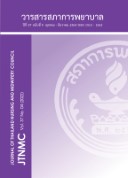Factors Predicting Career Attachment amongst Registered Nurses in Thailand
Keywords:
career attachment, proactive coping, job demands, job resources, registered nursesAbstract
Objective: To identify the factors capable of predicting career attachment amongst registered nurses in Thailand
Design: Predictive correlational research
Methodology: The subjects for this study were 518 registered nurses selected by multi-stage stratified cluster random sampling. All of the subjects worked for hospitals affiliated to the Office of the Permanent Secretary for Public Health, in 12 health areas. Data were collected using online questionnaires, consisting of: 1) the demographic questionnaire; 2) the proactive coping inventory; 3) the job demand questionnaire; 4) the job resources questionnaire; and 5) the career attachment questionnaire. The data were analysed using descriptive statistics, Chi-square statistics, Pearson’s product moment correlation coefficient, and multiple linear regression analysis using enter method.
Results: Based on the study, the subjects exhibited a high level of career attachment (mean = 4.13, SD = 1.18). The factors of age, proactive coping, strategic planning, job resources, and job demands were identified as capable of jointly predicting the subjects’ career attachment by 56.1% (R2 –adjusted = 0.561, p < 0.001).
Recommendations: It is recommended that executives of the Ministry of Public Health, administrators of the Nursing Division, and heads of a hospital’s nursing units or wards apply the study findings to developing a work-planning and proactive problem-solving skill enhancement programme and to establishing a direction for setting a policy conducive to nurses’ professional performance. Such application could serve the purpose of keeping registered nurses happy and competent in their career, strengthening their career attachment, and retaining registered nurses in the system.
Downloads
References
Khunthar A. The impacts and solutions to nursing workforce shortage in Thailand. Nursing Science Journal of Thailand. 2014;32(1):81-90. (in Thai)
Kangsanan K, Klinhom V. Quality of life of registered nurses in community hospitals zone 1 Nakhon Si Thammarat Province. WMS Journal of Management. 2018;6(2):72-82. (in Thai)
Newstrom JW. Organizational behavior. 12th ed. New Delhi: Tata McGraw;2007.
Khuntha A, Ketcham D, Sawangdee K, Teerawit T. Relocation of registered nurses in Thailand. Thai Journal of Nursing Council. 2014;28(3):19-31 (in Thai)
Srisatidnarakul B. Leadership and strategic management in nursing organization for the 21st century 2nd ed. Bangkok: Chulalongkorn University;2008. (in Thai)
Ministry of Health. 20-year national strategic plan (public health) [Internet]. 2016 [cited 2021 November 2]. Available from: https://waa.inter.nstda.or.th/stks/pub/2017/20171117-Ministry of Public Health.pdf
Leunam K, Semheng S, Sae-Tang S. A causal relationship model of factors affecting work engagement among professional nurses in the hospitals under the jurisdiction of the ministry. Journal of The Royal Thai Army Nurses. 2013;12(3):28-34. (in Thai)
Schaufeli WB, Salanova M, González-Romá V, Bakker AB. The measurement of engagement and burnout: A two sample confirmatory factor analytic approach. J Happiness Stud. 2002;3(1):71-92.
Bakker AB, Demerouti E. Towards a model of work engagement. Career Dev Int. 2008;13(3):209–23. doi:10.1108/13620430810870476.
Schultz DP, Schultz SE. Theories of Personality. 7th ed. U.S.A.: Trooks;1998.
Vetayavetin S, Srisatidnarakul B. Relationships between empowerment, work itself, and work engagement of professional nurses, private hospital. Journal of Nursing Science Chulalongkorn University. 2012;24(2):41-54. (in Thai)
Attakorn W, Timruangvej C. Employee Engagement of Roi Et Hospital. Roi-Et Kalasin Mahasarakham Hospital Medical Journal. 2012;19(1):52-65. (in Thai)
Wayne WD. Biostatistics: a foundation for analysis in the health sciences. 10th ed. Las Vegas: Edwards Brothers Molloy;2013.
Tatha O, Laurujisawat P, Greenglass E.The validity and reliability of the Proactive Coping Inventory (PCI): Thai version. Chulalongkorn Medical Journal. 2013;57(6):765-78. (in Thai)
Jackson L, Rothmann S. Work-related well-being of educators in a district of the North-West Province. Perspect Educ [Internet]. 2005 [cited 2021 April 21]; 23(1):107-22. Available from https://hdl.handle.net/10520/EJC87328.
Tatha O. The effect of job demands, job resources, and off-job recovery on mental and physical health among registered nurses in Thailand [Dissertation]. Tokyo: The university of Tokyo; 2020.
Cruz JP, Alquwez N, Balay‐odao E. Work engagement of nurses and the influence of spiritual climate of hospitals: a cross-sectional study. J Nurs Manag. 2022; 30(1): 279-87. doi:10.1111/jonm.13492.
Wan Q, Zhou W, Li Z, Shang S, Yu F. Work engagement and its predictors in registered nurses: a cross‐sectional design. Nurs Health Sci [Internet]. 2018 [cited 2022 September 13] ;20(4):415-21. Available from https://onlinelibrary.wiley.com/doi/abs/10.1111/nhs.12424.
Theucksuban B, Nantsupawat R, Wichaikhum O. Factors influencing job burnout among profassional nurses in Maharajnakornsrithammarat hospital. Thai Journal of Nursing Council. 2012;23(4):114. (in Thai)
Douglas S, Roberts R. Employee age and the impact on work engagement. Strategic HR Review. 2020; 19(5):209-13. doi:10.1108/SHR-05-2020-0049.
Nursing Division. Quality assurance of nursing in hospitals: inpatient nursing services. Bangkok: Office of the permanent secretary ministry of public health; 2001. (in Thai)
Barinua V, Deinma E. Strategic planning and employee engagement: Theoretical review. Strateg J Bus Change Manag. [Internet]. 2022 [cited 2022 September 13]; 9(1):942–54. Available from https://www.researchgate.net/publication/360396718
Van der Colff JJ, Rothmann S. Occupational stress, sense of coherence, coping, burnout and work engagement of registered nurses in South Africa. SA J Ind Psychol. 2009;35(1):1-10. doi:10.4102/sajip.v35i1.423.
Rothmann S, Jorgensen LI, Hill C. Coping and work engagement in selected South African organisations. SA J Ind Psychol. 2011;37(1):1-11. doi:10.4102/ sajip.v37i1.962
Vander ET, Cavents C, Daneels K, Johannik K, Baillien E, Van den Broeck A, et al. Job demands–resources predicting burnout and work engagement among Belgian home health care nurses: a cross-sectional study. Nurs outlook. 2016; 64(6):542-56. doi:10.1016/j. outlook.2016.06.004. PubMed PMID: 27427405.
Minh VD, Akkadechanunt T, Chitpakdee B. Job demands, job resources and work engagement among nurses in tertiary care hospitals, Thanh Hoa Province, The Socialist Republic of Vietnam. Nursing Journal. 2019;46(1): 159-72. (in Thai)
Nursing Council. Nursing council announcement policy of nurses working hours for patient safety [Internet]. 2017 [cited 2022 April 29]. Available from https://www.tnmc.or.th/images/userfiles/files/H002.pdf
Aarti S, Alok G, Santoshi S. How does work engagement vary with employee demography?: rRevelations from the Indian IT industry. Procedia Comput Sci. [Internet]. 2017 [cited 2022 September 24] ;122:146-53. Available from https://www.sciencedirect.com/science/article/pii/S1877050917325826
Nursing Division. Roles and duties of registered nurses. Nonthaburi: Suetawan; 2018. (in Thai
Downloads
Published
How to Cite
Issue
Section
License
Copyright (c) 2022 Thai Journal of Nursing Council

This work is licensed under a Creative Commons Attribution-NonCommercial-NoDerivatives 4.0 International License.








